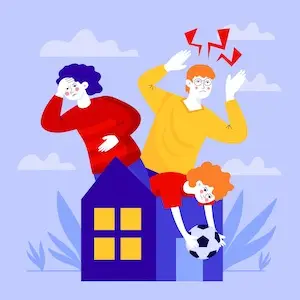

Living close to others can bring noise challenges. Sometimes, you might hear every detail of a neighbor’s party through the walls. This can ruin a quiet evening at home. So, handling neighbor conflicts requires tact. Common noise sources include late-night parties, noisy pets, and loud gaming. Recognizing these triggers helps you respond with empathy.
In the following example situations, anonymity can help. Writing an anonymous letter allows you to express concerns without confrontation. This method keeps the peace and promotes understanding. It ensures comfort and respect for everyone in the community.
Living in a neighborhood can sometimes lead to conflicts. Here are some common issues and tips on how to handle them:
Noise Complaints
Neighbors often complain about loud music or barking dogs. Avoid these issues by keeping noise levels down, especially at night.
Property Boundaries
Disagreements over property lines and fences happen frequently. To resolve these, check property records and discuss boundaries with your neighbor.
Overhanging Tree Branches
Tree branches can cause problems if they hang over into a neighbor’s yard. Trim your trees regularly to prevent disputes.
Parking Issues
Parking disagreements are common. Be considerate, park in designated areas, and avoid blocking driveways.
Unkempt Yards
Complaints arise when yards become messy. Maintain your yard regularly to avoid friction with your neighbors.
Trespassing
Trespassing often leads to tension. Respect property lines and ask permission before entering a neighbor’s yard.
Children Playing Outside
Children playing outside can cause conflicts if it gets excessive. Encourage kids to play respectfully and be mindful of noise and space.
By addressing these issues thoughtfully, you can maintain a peaceful and friendly neighborhood.
Powered By EmbedPress
Living in close proximity to others undoubtedly brings about its own set of challenges, with noise being one of the most common. While the sounds of a neighbor’s late-night party or a barking dog can disrupt the tranquility of your home, it’s important to approach these situations with sensitivity and understanding. Recognizing that these noise triggers are a part of communal living helps foster a more empathetic response to such disturbances.
Addressing noise issues tactfully is crucial in maintaining harmony within a neighborhood. An anonymous letter can be an effective tool for communicating concerns without direct confrontation. This approach not only respects the privacy of both parties but also encourages a peaceful dialogue that can lead to mutual understanding and cooperation.
Ultimately, living in a community involves navigating various conflicts. By remaining considerate and open to communication, neighbors can work together to create a respectful and harmonious environment. With empathy and tact, we can turn potential conflicts into opportunities for deeper connections and a more cohesive community.
Finally, please check out our Anonymous Written Letter Portfolio Page. There, you can find many examples of our work. We hope you find inspiration and encouragement to share your feelings!